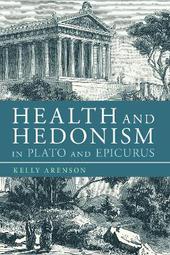
|
Health and Hedonism in Plato and Epicurus
Paperback / softback
Main Details
| Title |
Health and Hedonism in Plato and Epicurus
|
| Authors and Contributors |
By (author) Dr Kelly Arenson
|
| Physical Properties |
| Format:Paperback / softback | | Pages:232 | | Dimensions(mm): Height 234,Width 156 |
|
| Category/Genre | Western philosophy - Ancient to c 500
Ethics and moral philosophy |
|---|
| ISBN/Barcode |
9781350212312
|
| Classifications | Dewey:171.4 |
|---|
| Audience | | Professional & Vocational | |
|---|
|
Publishing Details |
| Publisher |
Bloomsbury Publishing PLC
|
| Imprint |
Bloomsbury Academic
|
| Publication Date |
29 October 2020 |
| Publication Country |
United Kingdom
|
Description
This book links Plato and Epicurus, two of the most prominent ethicists in the history of philosophy, exploring how Platonic material lays the conceptual groundwork for Epicurean hedonism. It argues that, despite their significant philosophical differences, Plato and Epicurus both conceptualise pleasure in terms of the health and harmony of the human body and soul. It turns to two crucial but underexplored sources for understanding Epicurean pleasure: Plato's treatment of psychological health and pleasure in the Republic, and his physiological account of bodily harmony, pleasure, and pain in the Philebus. Kelly Arenson shows first that, by means of his mildly hedonistic and sometimes overtly anti-hedonist approaches, Plato sets the agenda for future discussions in antiquity of the nature of pleasure and its role in the good life. She then sets Epicurus' hedonism against the backdrop of Plato's ontological and ethical assessments of pleasure, revealing a trend in antiquity to understand pleasure and pain in terms of the replenishment and maintenance of an organism's healthy functioning. Health and Hedonism in Plato and Epicurus will be of interest to anyone interested in the relationship between these two philosophers, ancient philosophy, and ethics.
Author Biography
Kelly Arenson is Assistant Professor of Philosophy at Duquesne University, USA.
Reviews[Author Kelly Arenson] not only manages to put forward compelling arguments for her interpretation of taste, sex and other non-restorative pleasures being katastematic pleasures but, in consequence, she frees our conception of Epicurean hedonism from a number of familiar tensions, thanks to which we can now see it in a completely different, more balanced and nuanced light. * Bryn Mawr Classical Review * Anyone interested in Epicurus' views on pleasure will need to take account of this book. Kelly Arenson carefully and subtly spells out the ways in which Epicurus' distinctive doctrines regarding pleasure have their roots in Plato, and she situates Epicurus' doctrines in the context of disputes about pleasure by students of Plato such as Aristotle, Eudoxus, and Speusippus. * Tim O'Keefe, Associate Professor of Philosophy, Georgia State University, USA * Arenson carefully and systematically sifts through relevant primary and secondary sources to build a plausible argument that the Epicureans tie pleasure (in all its varieties) to proper organic functioning. Anyone interested in Epicurean hedonism as a response to Platonist and early Academic views of pleasure should read this book. * Clerk Shaw, Associate Professor of Philosophy, The University of Tennessee Knoxville, USA *
|